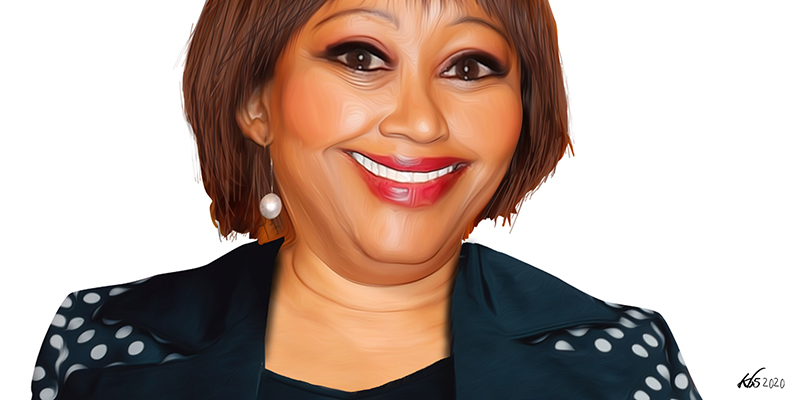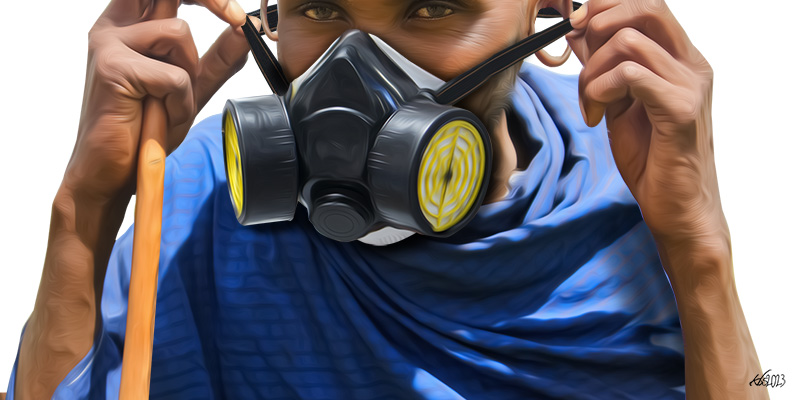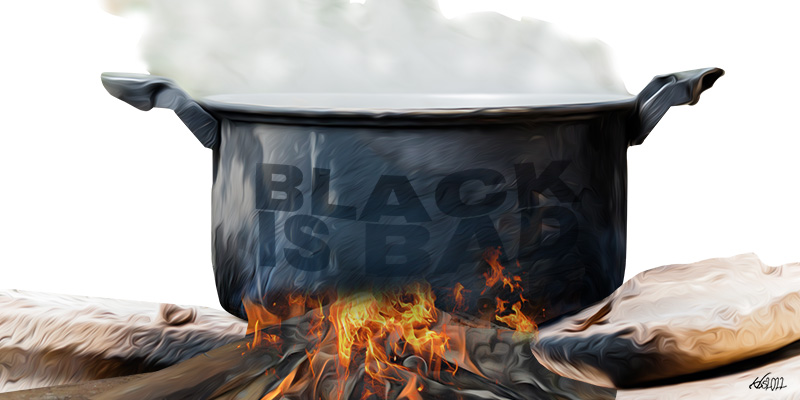On 10 February 1985, the world’s attention was drawn to the courageous defiance of 25-year- old Zindzi Mandela, the youngest of two daughters born to political prisoner Nelson Mandela and anti-apartheid revolutionary Winnie Madikizela-Mandela. The occasion was a rally at Soweto’s Jabulani Stadium organised by the anti-apartheid caucus, the United Democratic Front (UDF), to celebrate the awarding of the Nobel Peace Prize to Johannesburg’s Bishop Desmond Tutu. In the absence of her parents (Mandela in jail and Madikizela-Mandela banned and banished in Brandfort) anti-apartheid stalwart Albertina Sisulu took the role of guardian, standing next to Zindzi. Zindzi sang, danced and occasionally punched her clenched fist into the air to chants of Amandla!, before reading her father’s historic letter to the nation.
Apartheid South Africa’s President P.W. Botha had used prison back channels to offer Mandela the option of an early conditional release, having served two decades. In declining Botha’s overtures, Mandela sought to respond through a public communique, hence his decision to deploy Zindzi to the front lines.
Zindzi did not disappoint. Having grown into her own as an activist and witness to the barbarism the apartheid state had unleashed on Black South Africans, and especially on the Mandela–Madikizela-Mandela family, Zindzi powerfully delivered the nine-minute message, which was punctuated by recurring recitals of ‘‘my father and his comrades”. Her chosen refrain meant that Zindzi wasn’t only relaying Mandela’s words, but was also speaking on behalf of tens of political prisoners who lacked a medium through which to engage the masses.
Zindzi, pausing for effect to a roaring crowd, opened her address with the following words:
On Friday my mother and our attorney saw my father at Pollsmoor Prison to obtain his answer to Botha’s offer of conditional release. The prison authorities attempted to stop this statement from being made, but he [Mandela] would have none of it, and made it clear that he would make the statement to you, the people. Strangers like Bethell from England and Professor Dash from the United States have in recent weeks been authorised by Pretoria to see my father without restriction, yet Pretoria cannot allow you, the people, to hear what he has to say directly. He should be here himself to tell you what he thinks of this statement by Botha. He is not allowed to do so. My mother, who also heard his words, is also not allowed to speak to you today.
Through Zindzi, Mandela and his comrades reiterated their loyalty to both the people and their organisation, the African National Congress (ANC). Not wanting to assume that they naturally spoke for everyone, much as they wished to speak for many – the banished, the exiled, the oppressed and the exploited – Mandela and his cohort sought the people’s permission to have the prisoners’ stifled voices be representative of the collective plight of Black South Africans.
Answering Botha directly, Mandela wondered:
What freedom am I being offered while the organisation of the people remains banned? What freedom am I being offered when I may be arrested on a pass offence? What freedom am I being offered to live my life as a family with my dear wife who remains in banishment in Brandfort? What freedom am I being offered when I must ask for permission to live in an urban area? What freedom am I being offered when I need a stamp in my pass to seek work? What freedom am I being offered when my very South African citizenship is not respected? Only free men can negotiate. Prisoners cannot enter into contracts…Your freedom and mine cannot be separated. I will return.
Before her famous 1985 appearance – which pundits, after her passing on July 13 at the age of 59, said was the defining moment in Zindzi’s life– Zindzi, her sister Zenani and their mother Madikizela-Mandela travelled a tumultuous journey of deprivation, being eternal targets of the apartheid state. Speaking to the former New York Times Johannesburg correspondent Rick Lyman in Manhattan in 2013 at the launch of her father’s Idris Elba-played biopic, Mandela: Long Walk to Freedom, Zindzi recollected her earliest memory being of her sitting in a vehicle outside a police station as her mother delivered food to a jailed Mandela.
“I was 18 months old,’’ Zindzi told Lyman of her 1962 recollection, ‘‘but I can really remember that moment, sitting in the car, waiting for my mother to return. I must have sensed somehow that there had been some sort of trauma, and I was very scared. It was taking her so long.”
Lyman, writing about what he called the long arc of Zindzi’s life, juxtaposes her stark apartheid induced-realities in Soweto against the splendour of their meeting place in New York. ‘‘Ms. Mandela was recounting this memory [of her and her mother at the police station] while sipping a cranberry soda beneath the imposing columns of the Pierre Hotel’s elegant main bar in Manhattan, more than half a century later,’’ he wrote.
‘‘I had no notions back when I was a girl in Soweto or a young woman involved in the struggle,’’ Zindzi said of the drastic change in circumstance, ‘‘that I would one day go from that place to spending my life in rooms like this.”
“I was 18 months old,’’ Zindzi told Lyman of her 1962 recollection, ‘‘but I can really remember that moment, sitting in the car, waiting for my mother to return. I must have sensed somehow that there had been some sort of trauma, and I was very scared. It was taking her so long.”
Granted, there were no pretences in Zindzi’s sense of surprise at the drastic turn of events in her life and that of the Mandelas. The apartheid regime didn’t allow Zindzi and her elder sister Zenani to attend school. Speaking at the National Museum in Copenhagen, where she was South Africa’s Ambassador to Denmark from 2015 until her demise, Zindzi narrated the ordeal of how whichever school her mother enrolled them at, the head teacher got hounded by state security agents until the school had to let go of the Mandela girls. Wherever Madikizela-Mandela turned, the apartheid state followed, forcing her, with the assistance of benefactors, into sending her daughters to a Catholic school in Swaziland.
‘‘My mother learnt to be creative to try to keep us educated, and so she developed a trick of straightening our hair and changing our names, and taking us to so-called coloured schools,’’ Zindzi remembered. ‘‘And the same thing would happen there. The system would catch up with us, intimidate the principal and threaten them with detention, and we would have to leave the school. So at the age of five I was at home, not able to go to school. And my sister, just over six, was also stuck at home. Until someday somebody heard about our plight and offered my mother the option of taking us to school in Swaziland. That’s how we ended up in boarding school, at a place where she couldn’t come to visit us because she was under house arrest.’’
But as Zindzi posits during her Copenhagen speech, much as her life had its many tribulations, she chose to define it not according to her suffering but by how she overcame it, and nothing signifies this spirit of reclaiming her childhood, dignity and humanity more than how she chose to tightly embrace the little pleasures she experienced amidst the turmoil.
Writing in City Press, the chef and food anthropologist Anna Trapido chooses to remember Zindzi in a piece titled Zindzi Mandela: An Egg to Say Goodbye, where she revisits an egg-making recipe Zindzi passed on to her, a technique which Zindzi picked from one of the homes of her parents’ comrades where she and Zenani spent a considerable portion of their childhoods in their parents’ absence.
‘‘A plan was made whereby Dr Ntato Motlana, Fatima and Ismail Meer, Helen Joseph and Ilse Wilson were on standby to provide emergency parenting, which is where the eggs come in,’’ Trapido writes. ‘‘These arrangements weren’t always easy. Fatima Meer remembered that Zindzi and Zenani “were rarely happy with the arrangements and often complained or became the targets of their benefactors’ complaints”.
And yet, in later life, Zindzi chose to focus on positive remembering: “We loved Aunt Fatima’s curried eggs – well, they were actually Uncle Ish’s eggs, Aunt Fatima doesn’t cook. I now know they are great for a hangover too – they work wonders, especially on toast. But back then during school holidays, if mummy was locked up we would go to Aunt Fatima. Uncle Ish showed us how you fry an egg with grated onion, chopped up chillies and masala. In recent years my kids have added a twist of putting grated cheese on top, but that’s not in the original.”
Aside from anecdotes about Uncle Ish’s eggs, Trapido bares testimony about the friend she knew, Zindzi the person, insights which reveal more of what the Mandela daughter carried to her grave – her desire to protect her parents, more so her mother, whose victimisation Zindzi witnessed at close proximity.
‘‘More than anything, Zindzi was motherly. When I subsequently encountered Winnie Madikizela-Mandela and Zindzi together, I often thought that the daughter mothered the mother, at least as often as the other way around,’’ Trapido writes. ‘‘Theirs was an intense bond. As a tiny girl Zindzi saw her mother repeatedly persecuted and alone.’’
Yet Trapido’s Zindzi Mandela story isn’t a sad one, just like Zindzi’s telling of her own story was never about surrender. ‘‘She carried her pain with such a good grace that it was often overlooked and underestimated. She told endless funny stories about her dreadful experiences, and did great impressions of both her parents,’’ Trapido writes. ‘‘She avoided painful thoughts and generally chose to focus on those who brought comfort amid the confusion.’’
When Mandela left prison and became a darling of especially the Western press, there seemed to be an irresistible urge to vilify Madikizela-Mandela in an effort to further elevate him, and it was in such instances that Zindzi lived up to what Trapido describes – not just a mother and daughter mothering each other but of two comrades in arms. The newly freed Mandela was fashioned as the father of the Rainbow Nation, while Madikizela-Mandela and the likes of Chris Hani, who believed there cannot be peace without justice, were painted as unruly.
‘‘More than anything, Zindzi was motherly. When I subsequently encountered Winnie Madikizela-Mandela and Zindzi together, I often thought that the daughter mothered the mother, at least as often as the other way around,’’ Trapido writes. ‘‘Theirs was an intense bond. As a tiny girl Zindzi saw her mother repeatedly persecuted and alone.’’
In her conversation with Rick Lyman of the New York Times, more context emerges as Zindzi defends Madikizela-Mandela’s and other ANC activists’ revolutionary ways, making the case that freedom was fought for and not given as a gift. Lyman reports that Zindzi ‘‘was angry with him [Mandela] for coming out of prison with a message of reconciliation rather than the military triumph that she and her mother and many other township activists craved.’’ Lyman quotes Zindzi saying “I just didn’t believe that people could change their minds overnight” in reference to the softened stance of battle=hardened uMkhonto we Sizwe founders and soldiers.
And yet, Zindzi was equally loving and protective of Mandela, even if she didn’t fully agree with everything he espoused, as Lyman narrates. ‘‘Now, she said, she rarely talks about those difficult years with her own children or the many other Mandela grandchildren,’’ he wrote, ‘‘worried that it might somehow betray her father’s policy of reconciliation.’’
For Zindzi, her parents’ humanity came first, and she took it upon herself to present them as the complicated individuals they were, having had an equally unusual marriage and relationship. In part, her efforts debunked the myth that her father was a saint and her mother was a sinner.
“He is a human being,’’ Zindzi told Lyman. ‘‘An extraordinary one, but a human being.”
As she wrote about Zindzi’s egg recipe, Anna Trapido similarly wondered what Mandela’s absence on the home front meant for his young children, who were all under the age of 16 and so weren’t allowed to visit inmates. How much did this absentee parenting impact Zindzi and Zenani?
‘‘The horrors of the adult Mandela experience of parenting in extremis have been better articulated and appreciated than those of the children who lived in the same context but with less autonomy and understanding,’’ Trapido writes on the kids’ predicament. ‘‘We know from prison letters that the problems of explaining a complex political struggle to very young children weighed heavy on Madiba’s mind and conscience. We know much less about the experience of the children he was worrying about…Zindzi and Zenani lived through the darkest days of their parent’s persecution with nothing but written contact with their father.’’
Meanwhile, Zindzi and Zenani’s other parent was either being arrested, banned or banished.
Taking this to account allows one to see Zindzi’s frustrations especially with Mandela in a different light, like when the New York Times’ Lyman writes that Zindzi ‘‘was quite bitter with her father for leaving the family and disappearing into the ANC underground and then prison. And even after he was released, pressing duties kept him away from the family.’’
This is understandable, since all Zindzi wanted was to have a father and a normal family life. But even as she made these poignant reflections, Zindzi’s characteristic it’s-serious-but-it-isn’t nature popped up as she told Lyman, “I used to joke that, at least when he was in prison, I was guaranteed two visits every month.” Sometimes, all a girl wants is to have her father to herself.
It was therefore not accidental that throughout her life, Zindzi was almost always reduced to either being her father’s spokesperson, courtesy of her reading his 10 February 1985 speech, or her mother’s defender, a role that dominated her adult life – like when she appeared in the Pascale Lamche film Winnie (2017) and stood by her mother against Archbishop Tutu’s request that Madikizela-Mandela apologise to South Africa during hearings of the Truth and Justice Commission for oversights during the struggle, or when there was an attempt to downplay Madikizela-Mandela’s final acts of love towards Mandela during his final hours.
After her famous parents died, Zindzi seems to have upped the ante on her activism. Disregarding all diplomatic courtesies, Zindzi took to Twitter on 14 June 2019 and expressed what has been considered support for the clamour for land expropriation without compensation. ‘‘Dear apartheid apologists, your time is over,’’ she wrote. ‘‘You will not rule again. We do not fear you. Finally.’’ #TheLandIsOurs was Zindzi’s hashtag of choice.
It was therefore not accidental that throughout her life, Zindzi was almost always reduced to either being her father’s spokesperson, courtesy of her reading his 10 February 1985 speech, or her mother’s defender, a role that dominated her adult life…
As if that hadn’t stirred things up enough, Zindzi followed up with a half-teasing rejoinder, deploying the #OurLand hashtag. ‘‘Whilst I wine and dine here…’’ she tweeted, ‘‘wondering how the world of shivering land thieves is doing.’’ South Africans on Twitter went berserk.
According to those who took offence, Zindzi shouldn’t have written what she wrote. Others had issue with her tone, while many more saw nothing wrong with Zindzi’s opinions or how she expressed them.
The ANC government chose to play it safe, at least in public. International relations and cooperation minister, Naledi Pandor, told the press she had spoken to Zindzi about the sort of conduct expected of a serving diplomat, and saw no reason why any further sanction should be instituted against the ambassador. However, in an op-ed commiserating with the Mandelas on Zindzi’s passing published in City Press, Economic Freedom Fighters (EFF) leader Julius Malema suggested that Pretoria was not comfortable with Zindzi’s public stance on the land question, and that her impending redeployment to Monrovia just before her passing was some form of demotion, punishment for unbecoming behaviour of a diplomat.
‘‘We remember that even when many of her generation, from the comfort of post-apartheid state positions and careers remained silent at the call for land expropriation without compensation, Mama Zindzi did not,’’ Malema wrote. ‘‘These ignorant peacetime cowards tried to intimidate and threaten her, even by deploying her to Liberia as a way of silencing and shaming her. In their ignorance, they could not see that intimidation would never quieten the fierceness of Zindzi, who had braved so much from a tender age to resist the ruthless apartheid regime. Her ambassadorial office would never weaken or compromise any of her convictions, particularly when it came to the total emancipation of her people.’’
In the end, it all came down to Zindzi’s stance on the land question.








